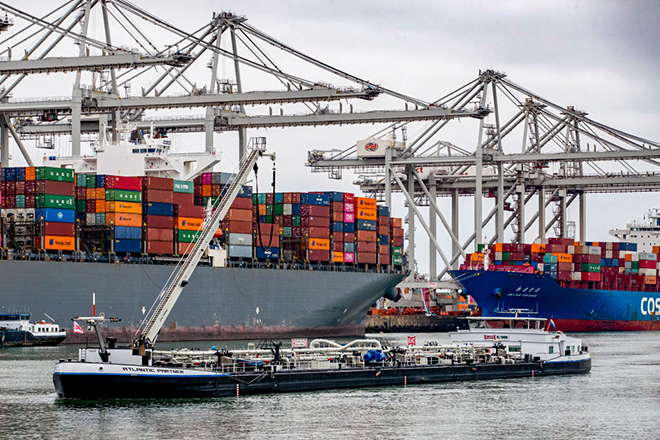Featured Topics
Featured Products
Events
S&P Global Offerings
Featured Topics
Featured Products
Events
S&P Global Offerings
Featured Topics
Featured Products
Events
S&P Global Offerings
Featured Topics
Featured Products
Events
Financial and Market intelligence
Fundamental & Alternative Datasets
Government & Defense
Professional Services
Banking & Capital Markets
Economy & Finance
Energy Transition & Sustainability
Technology & Innovation
Podcasts & Newsletters
Financial and Market intelligence
Fundamental & Alternative Datasets
Government & Defense
Professional Services
Banking & Capital Markets
Economy & Finance
Energy Transition & Sustainability
Technology & Innovation
Podcasts & Newsletters
9 Aug, 2022

By Sanne Wass

| U.S. authorities have warned that banks may be inadvertently financing the trade of goods used in Russia's war effort. Source: BSR Agency/Getty Images News via Getty Images Europe. |
Regulators are raising expectations for banks' compliance programs amid concerns that lenders could be breaching U.S. export controls by financing the trade of equipment for military use in Russia through intermediary countries.
Banks may be facilitating the trade of technologies and other military-related items to jurisdictions that serve as "transshipment hubs" for reexport to Russia, according to a June alert by the U.S. Financial Crimes Enforcement Network, or FinCEN, and the Bureau of Industry and Security, or BIS. Transshipment is a term used when goods are reloaded onto another ship before continuing to the next destination.
The alert urged banks, particularly those involved in trade finance, to be vigilant against efforts to evade BIS export controls implemented in connection with Russia's war in Ukraine. It also included a list of commodities of "special concern" because of their potential diversion to an end-use by Russia to sustain its military and defense capabilities.
"Radars, GPS systems, antennas, things like that, those are all key components of specific types of military goods," said Ravi Amin, trade compliance subject matter expert at S&P Global Market Intelligence. "Banks will have to start looking at those goods in case some of them are reshipped to Russia."

Market Intelligence data shows that countries such as Turkey, China, India and Vietnam have increased exports of select commodities of concern in recent months. These jurisdictions may be used as a "throughway" into Russia by actors in countries facing tighter trade restrictions, Amin said.
Trade finance covers financial instruments that support companies' exports and imports. The world's largest providers include Citigroup Inc., HSBC Holdings PLC, BNP Paribas SA, Standard Chartered PLC, Deutsche Bank AG and Société Générale SA, which all have U.S. bank licenses and are covered by U.S. export controls and obligations to report suspicious activity.
Potential transshipment hubs
The U.S. export administration regulation prohibits the export, reexport or financing of any items subject to U.S. export controls. It also bans proceeding with transactions "with knowledge that a violation has occurred or is about to occur." The regulation applies equally to U.S. and non-U.S. persons and entities, law firm Clifford Chance said in a note last month.
Even if certain international trade is lawful and does not require a U.S. export/reexport license, financial transfers associated with items destined for Russia will attract more attention from government agencies, said law firm Steptoe & Johnson in a July 18 note. Banks should consider how to update their compliance programs, policies and procedures to address the increased export controls targeting Russia, it said.
"There is absolutely a heightened enforcement risk for banks," said David Tannenbaum, a director at consulting firm Blackstone Compliance Services and a former U.S. sanctions enforcement officer. Noncompliance may result in enforcement actions from the BIS, or a case could be referred to the Office of Foreign Assets Control, Tannenbaum said.
Banks will also likely play a bigger role in providing financial intelligence to the BIS for criminal cases against other market participants, such as exporters and freight forwarders, Tannenbaum said.
FinCEN and BIS are asking banks to pay special attention to goods being exported to countries including Brazil, China, India, Israel, Mexico, Singapore, South Africa, Turkey and the United Arab Emirates, which the agencies have identified as "common transshipment points through which restricted or controlled exports have been known to pass before reaching destinations in Russia or Belarus."
Several of these countries have increased exports of select commodities of concern to Russia since the outbreak of the war in Ukraine, as other trading partners such as the U.S. and EU have pulled back from the Russian market, according to Market Intelligence's Global Trade Analytics Suite.

China, for one, increased exports of integrated circuits, also known as computer chips, to Russia by 191% between January and May, while exports of inertial measurement units to Russia rose 136%.
Turkey grew exports of antennas to Russia by 168% in the period, vacuum pumps by 47% and integrated circuits by 1,895%. Vietnam and India were also among the trading partners that recorded significantly higher exports of integrated circuits to Russia in May compared to January.
More red flags
While requirements for banks to identify and report suspicious activity to U.S. authorities is unchanged, financial institutions are expected to search for and detect more red flags, said Terence Grugan, an attorney at Ballard Spahr.
The alert from FinCEN and BIS highlighted 22 specific red flags to assist banks in determining whether an identified activity may be connected to export control evasion. This could involve a payment being made by an entity in a potential transshipment point that is not otherwise involved in a transaction, or a trade that was previously going to Russia but is now destined for a transshipment country. Banks also need to look out for freight-forwarding companies listed as the product's final end customer in traditional Russian transshipment hubs.
Banks with systemic flaws in their compliance program can be held liable for financing sanctions evasions, Grugan said.
A Deutsche Bank spokesperson said international banks already have in place comprehensive controls to comply with sanctions regulations and have "continuously adapted to the changes of the last half year to implement the new sanctions against Russia," including lists of designated parties as well as those related to goods. Many of the steps taken by banks go beyond the regulatory mandatory requirements, the spokesperson said.
"We constantly monitor and audit the reliability of sanctions compliance programs and adjust them to the developing challenges in a risk-based way," the spokesperson added.
The other banks mentioned in this story declined to comment.